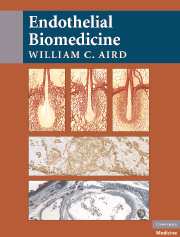Book contents
- Frontmatter
- Contents
- Editor, Associate Editors, Artistic Consultant, and Contributors
- Preface
- PART I CONTEXT
- PART II ENDOTHELIAL CELL AS INPUT-OUTPUT DEVICE
- PART III VASCULAR BED/ORGAN STRUCTURE AND FUNCTION IN HEALTH AND DISEASE
- PART IV DIAGNOSIS AND TREATMENT
- 172 Introductory Essay: Diagnosis and Treatment
- 173 Circulating Markers of Endothelial Function
- 174 Blood Endothelial Cells
- 175 Endothelial Microparticles: Biology, Function, Assay and Clinical Application
- 176 Molecular Magnetic Resonance Imaging
- 177 Real-Time Imaging of the Endothelium
- 178 Diagnosing Endothelial Cell Dysfunction
- 179 Statins
- 180 Steroid Hormones
- 181 Organic Nitrates: Exogenous Nitric Oxide Administration and Its Influence on the Vascular Endothelium
- 182 Therapeutic Approaches to Altering Hemodynamic Forces
- 183 Stent- and Nonstent-Based Cell Therapy for Vascular Disease
- 184 Building Blood Vessels
- 185 Gene Transfer and Expression in the Vascular Endothelium
- 186 Drug Targeting to Endothelium
- PART V CHALLENGES AND OPPORTUNITIES
- Index
- Plate section
180 - Steroid Hormones
from PART IV - DIAGNOSIS AND TREATMENT
Published online by Cambridge University Press: 04 May 2010
- Frontmatter
- Contents
- Editor, Associate Editors, Artistic Consultant, and Contributors
- Preface
- PART I CONTEXT
- PART II ENDOTHELIAL CELL AS INPUT-OUTPUT DEVICE
- PART III VASCULAR BED/ORGAN STRUCTURE AND FUNCTION IN HEALTH AND DISEASE
- PART IV DIAGNOSIS AND TREATMENT
- 172 Introductory Essay: Diagnosis and Treatment
- 173 Circulating Markers of Endothelial Function
- 174 Blood Endothelial Cells
- 175 Endothelial Microparticles: Biology, Function, Assay and Clinical Application
- 176 Molecular Magnetic Resonance Imaging
- 177 Real-Time Imaging of the Endothelium
- 178 Diagnosing Endothelial Cell Dysfunction
- 179 Statins
- 180 Steroid Hormones
- 181 Organic Nitrates: Exogenous Nitric Oxide Administration and Its Influence on the Vascular Endothelium
- 182 Therapeutic Approaches to Altering Hemodynamic Forces
- 183 Stent- and Nonstent-Based Cell Therapy for Vascular Disease
- 184 Building Blood Vessels
- 185 Gene Transfer and Expression in the Vascular Endothelium
- 186 Drug Targeting to Endothelium
- PART V CHALLENGES AND OPPORTUNITIES
- Index
- Plate section
Summary
Many cellular responses to steroid hormones involve the transcriptional modulation of target genes by the prototypical nuclear receptor, the steroid hormone receptor. In the classic model of steroid hormone action, steroid hormones such as estrogen and glucocorticoids function essentially as ligand dependent transcription factors by either activating or repressing gene expression through direct interactions with DNA or other transcription factors. However, recent evidence suggests an important role for the nontranscriptional effects of steroid hormones in the vascular system, particularly in endothelial cells (ECs), where they mediate the rapid activation of endothelial nitric oxide synthase (eNOS).
For example, the activated estrogen receptor (ER) mediates signaling cascades that culminate in direct protective effects such as vasodilation, inhibition of response to vessel injury, limiting myocardial injury after infarction, and attenuating cardiac hypertrophy. These effects of ER are mediated by rapid signaling pathways at the membrane and in the cytoplasm via various second messengers including protein kinases. Similarly, the nontranscriptional actions of the glucocorticoid receptor (GR) involve the rapid activation of protein kinases, such as phosphoinositide 3-kinase (PI3K) and Akt, leading to the activation of eNOS. These rapid, nongenomic pathways of estrogen and glucocorticoids may provide the pharmacological basis for future therapeutic approaches to cardiovascular diseases (Table 180–1).
SIGNALING PATHWAYS MEDIATED BY STEROID HORMONES
The study of steroid hormone action has provided many important insights into the regulation of cellular functions by nuclear receptors and, at the same time, has revealed surprising levels of biological complexity.
- Type
- Chapter
- Information
- Endothelial Biomedicine , pp. 1674 - 1681Publisher: Cambridge University PressPrint publication year: 2007



